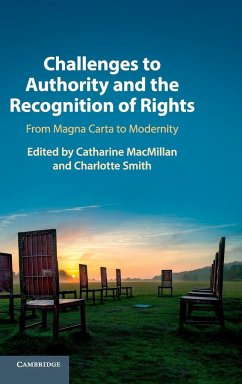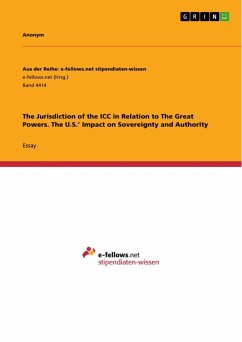Challenges to Authority and the Recognition of Rights
Herausgeber: MacMillan, Catharine; Smith, Charlotte
Challenges to Authority and the Recognition of Rights
Herausgeber: MacMillan, Catharine; Smith, Charlotte
- Gebundenes Buch
- Merkliste
- Auf die Merkliste
- Bewerten Bewerten
- Teilen
- Produkt teilen
- Produkterinnerung
- Produkterinnerung
A unique volume demonstrating how law changes by reason of challenges to authority which seek the recognition of rights.
Andere Kunden interessierten sich auch für
![International Authority and the Responsibility to Protect International Authority and the Responsibility to Protect]() Anne OrfordInternational Authority and the Responsibility to Protect119,99 €
Anne OrfordInternational Authority and the Responsibility to Protect119,99 €![The Rule-making Authority in the English Supreme Court The Rule-making Authority in the English Supreme Court]() Samuel RosenbaumThe Rule-making Authority in the English Supreme Court32,99 €
Samuel RosenbaumThe Rule-making Authority in the English Supreme Court32,99 €![Contemporary Challenges to the Laws of War Contemporary Challenges to the Laws of War]() Contemporary Challenges to the Laws of War90,99 €
Contemporary Challenges to the Laws of War90,99 €![Authority and the Globalisation of Inclusion and Exclusion Authority and the Globalisation of Inclusion and Exclusion]() Hans LindahlAuthority and the Globalisation of Inclusion and Exclusion77,99 €
Hans LindahlAuthority and the Globalisation of Inclusion and Exclusion77,99 €![Testimonies to the Divine Authority and Inspiration of the Holy Scriptures As Taught by the Church of England. in Reply to the Statements of Mr. James Fitzjames Stephen Testimonies to the Divine Authority and Inspiration of the Holy Scriptures As Taught by the Church of England. in Reply to the Statements of Mr. James Fitzjames Stephen]() Alexander MccaulTestimonies to the Divine Authority and Inspiration of the Holy Scriptures As Taught by the Church of England. in Reply to the Statements of Mr. James Fitzjames Stephen30,99 €
Alexander MccaulTestimonies to the Divine Authority and Inspiration of the Holy Scriptures As Taught by the Church of England. in Reply to the Statements of Mr. James Fitzjames Stephen30,99 €![Human Rights in Bosnia and Herzegovina and Serbia. Challenges for Respective National Responses to the European Convention on Human Rights (ECHR) Human Rights in Bosnia and Herzegovina and Serbia. Challenges for Respective National Responses to the European Convention on Human Rights (ECHR)]() Peda DurasovicHuman Rights in Bosnia and Herzegovina and Serbia. Challenges for Respective National Responses to the European Convention on Human Rights (ECHR)47,95 €
Peda DurasovicHuman Rights in Bosnia and Herzegovina and Serbia. Challenges for Respective National Responses to the European Convention on Human Rights (ECHR)47,95 €![The Jurisdiction of the ICC in Relation to The Great Powers. The U.S.' Impact on Sovereignty and Authority The Jurisdiction of the ICC in Relation to The Great Powers. The U.S.' Impact on Sovereignty and Authority]() AnonymousThe Jurisdiction of the ICC in Relation to The Great Powers. The U.S.' Impact on Sovereignty and Authority18,95 €
AnonymousThe Jurisdiction of the ICC in Relation to The Great Powers. The U.S.' Impact on Sovereignty and Authority18,95 €-
-
-
A unique volume demonstrating how law changes by reason of challenges to authority which seek the recognition of rights.
Produktdetails
- Produktdetails
- Verlag: Cambridge University Press
- Seitenzahl: 362
- Erscheinungstermin: 16. August 2018
- Englisch
- Abmessung: 235mm x 157mm x 26mm
- Gewicht: 738g
- ISBN-13: 9781108429238
- ISBN-10: 1108429238
- Artikelnr.: 50555505
- Herstellerkennzeichnung
- Libri GmbH
- Europaallee 1
- 36244 Bad Hersfeld
- gpsr@libri.de
- Verlag: Cambridge University Press
- Seitenzahl: 362
- Erscheinungstermin: 16. August 2018
- Englisch
- Abmessung: 235mm x 157mm x 26mm
- Gewicht: 738g
- ISBN-13: 9781108429238
- ISBN-10: 1108429238
- Artikelnr.: 50555505
- Herstellerkennzeichnung
- Libri GmbH
- Europaallee 1
- 36244 Bad Hersfeld
- gpsr@libri.de
Introduction Catharine MacMillan; Part I. Magna Carta, Challenges to
Authority and the Recognition of Rights in England: 1. Magna Carta: the
emergence of the myth John Baker; 2. Benefit of clergy and the authority of
Magna Carta Margaret McGlynn; 3. How to get rid of a king: lawyering the
Revolution of 1399 David Seipp; 4. Magna Carta and the fragmented
authorities of the later Middle Ages Anthony Musson; 5. Revolution
principles and the revolution bench Mike Macnair; Part II. Broader
Challenges to Authority and the Recognition of Rights in England: 6. Magna
Carta Clauses 4 and 5 and the problem of account Joshua Getzler; 7. Some
effects of war on the law in late eighteenth and early nineteenth-century
England James Oldham; 8. Tax, freedom and social expectations: fiscal
impact on the built environment in nineteenth-century England Chantal
Stebbings; Part III. Magna Carta, Challenges to Authority and the
Recognition (and Rejection) of Rights beyond England: 9. The Magna Carta in
the German discourse about English constitutional law between the
eighteenth and the early twentieth century Andreas Thier; 10. A Magna Carta
for the world? The constitutional protection of foreign subjects in the age
of revolution Daniel Hulsebosch; 11. 'The state of slavery': the slave,
grace, and the rise of pro-slavery constitutionalism in the
nineteenth-century Atlantic world Patricia Hagler Minter; 12. The Royal
Proclamation of 1763: an indigenous Magna Carta's rough ride in British
Columbia Hamar Foster; 13. 'Law: challenges to authority and the
recognition of rights': examples from British India Raymond Cocks; 14.
'Unfortunate necessities of warfare?': Australia's national security
regulations and the right to free speech during World War I Diane Kirkby.
Authority and the Recognition of Rights in England: 1. Magna Carta: the
emergence of the myth John Baker; 2. Benefit of clergy and the authority of
Magna Carta Margaret McGlynn; 3. How to get rid of a king: lawyering the
Revolution of 1399 David Seipp; 4. Magna Carta and the fragmented
authorities of the later Middle Ages Anthony Musson; 5. Revolution
principles and the revolution bench Mike Macnair; Part II. Broader
Challenges to Authority and the Recognition of Rights in England: 6. Magna
Carta Clauses 4 and 5 and the problem of account Joshua Getzler; 7. Some
effects of war on the law in late eighteenth and early nineteenth-century
England James Oldham; 8. Tax, freedom and social expectations: fiscal
impact on the built environment in nineteenth-century England Chantal
Stebbings; Part III. Magna Carta, Challenges to Authority and the
Recognition (and Rejection) of Rights beyond England: 9. The Magna Carta in
the German discourse about English constitutional law between the
eighteenth and the early twentieth century Andreas Thier; 10. A Magna Carta
for the world? The constitutional protection of foreign subjects in the age
of revolution Daniel Hulsebosch; 11. 'The state of slavery': the slave,
grace, and the rise of pro-slavery constitutionalism in the
nineteenth-century Atlantic world Patricia Hagler Minter; 12. The Royal
Proclamation of 1763: an indigenous Magna Carta's rough ride in British
Columbia Hamar Foster; 13. 'Law: challenges to authority and the
recognition of rights': examples from British India Raymond Cocks; 14.
'Unfortunate necessities of warfare?': Australia's national security
regulations and the right to free speech during World War I Diane Kirkby.
Introduction Catharine MacMillan; Part I. Magna Carta, Challenges to
Authority and the Recognition of Rights in England: 1. Magna Carta: the
emergence of the myth John Baker; 2. Benefit of clergy and the authority of
Magna Carta Margaret McGlynn; 3. How to get rid of a king: lawyering the
Revolution of 1399 David Seipp; 4. Magna Carta and the fragmented
authorities of the later Middle Ages Anthony Musson; 5. Revolution
principles and the revolution bench Mike Macnair; Part II. Broader
Challenges to Authority and the Recognition of Rights in England: 6. Magna
Carta Clauses 4 and 5 and the problem of account Joshua Getzler; 7. Some
effects of war on the law in late eighteenth and early nineteenth-century
England James Oldham; 8. Tax, freedom and social expectations: fiscal
impact on the built environment in nineteenth-century England Chantal
Stebbings; Part III. Magna Carta, Challenges to Authority and the
Recognition (and Rejection) of Rights beyond England: 9. The Magna Carta in
the German discourse about English constitutional law between the
eighteenth and the early twentieth century Andreas Thier; 10. A Magna Carta
for the world? The constitutional protection of foreign subjects in the age
of revolution Daniel Hulsebosch; 11. 'The state of slavery': the slave,
grace, and the rise of pro-slavery constitutionalism in the
nineteenth-century Atlantic world Patricia Hagler Minter; 12. The Royal
Proclamation of 1763: an indigenous Magna Carta's rough ride in British
Columbia Hamar Foster; 13. 'Law: challenges to authority and the
recognition of rights': examples from British India Raymond Cocks; 14.
'Unfortunate necessities of warfare?': Australia's national security
regulations and the right to free speech during World War I Diane Kirkby.
Authority and the Recognition of Rights in England: 1. Magna Carta: the
emergence of the myth John Baker; 2. Benefit of clergy and the authority of
Magna Carta Margaret McGlynn; 3. How to get rid of a king: lawyering the
Revolution of 1399 David Seipp; 4. Magna Carta and the fragmented
authorities of the later Middle Ages Anthony Musson; 5. Revolution
principles and the revolution bench Mike Macnair; Part II. Broader
Challenges to Authority and the Recognition of Rights in England: 6. Magna
Carta Clauses 4 and 5 and the problem of account Joshua Getzler; 7. Some
effects of war on the law in late eighteenth and early nineteenth-century
England James Oldham; 8. Tax, freedom and social expectations: fiscal
impact on the built environment in nineteenth-century England Chantal
Stebbings; Part III. Magna Carta, Challenges to Authority and the
Recognition (and Rejection) of Rights beyond England: 9. The Magna Carta in
the German discourse about English constitutional law between the
eighteenth and the early twentieth century Andreas Thier; 10. A Magna Carta
for the world? The constitutional protection of foreign subjects in the age
of revolution Daniel Hulsebosch; 11. 'The state of slavery': the slave,
grace, and the rise of pro-slavery constitutionalism in the
nineteenth-century Atlantic world Patricia Hagler Minter; 12. The Royal
Proclamation of 1763: an indigenous Magna Carta's rough ride in British
Columbia Hamar Foster; 13. 'Law: challenges to authority and the
recognition of rights': examples from British India Raymond Cocks; 14.
'Unfortunate necessities of warfare?': Australia's national security
regulations and the right to free speech during World War I Diane Kirkby.









